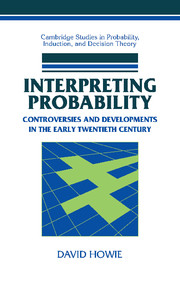Book contents
- Frontmatter
- Contents
- Acknowledgments
- 1 Introduction
- 2 Probability up to the Twentieth Century
- 3 R.A. Fisher and Statistical Probability
- 4 Harold Jeffreys and Inverse Probability
- 5 The Fisher–Jeffreys Exchange, 1932–1934
- 6 Probability During the 1930s
- 7 Epilogue and Conclusions
- Appendix 1 Sources for Chapter 2
- Appendix 2 Bayesian Conditioning as a Model of Scientific Inference
- Appendix 3 Abbreviations Used in the Footnotes
- Bibliography
- Index
Appendix 1 - Sources for Chapter 2
Published online by Cambridge University Press: 07 July 2009
- Frontmatter
- Contents
- Acknowledgments
- 1 Introduction
- 2 Probability up to the Twentieth Century
- 3 R.A. Fisher and Statistical Probability
- 4 Harold Jeffreys and Inverse Probability
- 5 The Fisher–Jeffreys Exchange, 1932–1934
- 6 Probability During the 1930s
- 7 Epilogue and Conclusions
- Appendix 1 Sources for Chapter 2
- Appendix 2 Bayesian Conditioning as a Model of Scientific Inference
- Appendix 3 Abbreviations Used in the Footnotes
- Bibliography
- Index
Summary
My description of the development of probability theory from the mid-seventeenth to the end of the nineteenth centuries relies chiefly on secondary sources. Many of these were published in the last fifteen years. The literature of the history and philosophy of probability, though extremely rich, is still of manageable size.
Ian Hacking, in The Emergence of Probability: a Philosophical Study of Early Ideas about Probability, Induction and Statistical Inference (London: Cambridge University Press, 1975), describes how ideas of chance events and uncertain knowledge were blended during the late seventeenth and eighteenth centuries into a single theory of mathematical probability. In Classical Probability in the Enlightenment (Princeton, N.J.: Princeton University Press, 1988), Lorraine Daston examines the transformation of the classical calculus during the eighteenth century from a theory of games of chance to a model of rational thought. The new doctrine of chances was applied not only to the numerical uncertainty of insurance premiums or astronomical observations, but to matters of judgment in law, politics, and the moral sciences.
The nineteenth century is covered in Hacking's The Taming of Chance (Cambridge: Cambridge University Press, 1990), and Theodore Porter's The Rise of Statistical Thinking, 1820–1900 (Princeton: Princeton University Press, 1986). Hacking argues that statistical and probabilistic methods were seen as granting a degree of predictability and control to the chaos of human behavior when applied in the social sphere during the early part of the century, but as undermining the doctrine of determinism when applied to the physical sciences towards the end.
- Type
- Chapter
- Information
- Interpreting ProbabilityControversies and Developments in the Early Twentieth Century, pp. 231 - 234Publisher: Cambridge University PressPrint publication year: 2002

